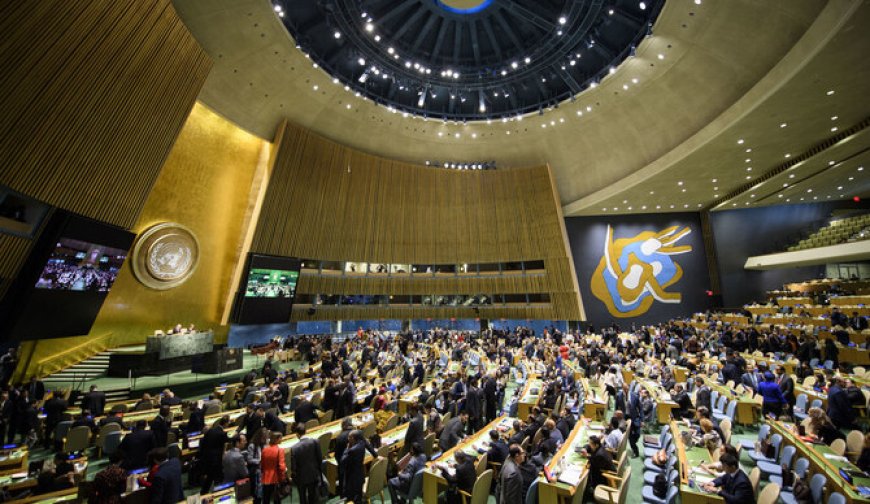UN General Assembly to Decide on Resolution Demanding Israel to End Its Occupation
On Wednesday, the United Nations General Assembly is scheduled to vote on a much awaited Palestinian resolution urging the end of Israel's occupation of Gaza and the West Bank. The resolution aims to strengthen worldwide pressure on Israel to remove its armed forces and settlers from Palestinian territory within a year as Israel's conflict against Hamas in Gaza gets ready for its first anniversary. With the continuous war between Israel and Hamas driving instability, this crucial vote comes at a period when violence in the area is at its highest.

On Wednesday, the United Nations General Assembly is scheduled to vote on a much awaited Palestinian resolution urging the end of Israel's occupation of Gaza and the West Bank. The resolution aims to strengthen worldwide pressure on Israel to remove its armed forces and settlers from Palestinian territory within a year as Israel's conflict against Hamas in Gaza gets ready for its first anniversary. With the continuous war between Israel and Hamas driving instability, this crucial vote comes at a period when violence in the area is at its highest.
Rooted in the mid-20th century, the Israeli-Palestinian conflict centers on geographical issues, national sovereignty, and Palestinian rights to self-determination. Since the Six-Day War in 1967, when it seized the West Bank and Gaza, Israel has had a military presence there. Supported by international agreements and legal rulings, Palestinians have long sought an end to Israel's rule and demanded an independent state with East Jerusalem as its capital.
Based on a July 2024 decision by the International Court of Justice (ICJ), which said Israel's position in Palestinian territory illegal under international law is illegal, the present resolution relies on Though non-binding, the ICJ decision gave the Palestinian cause great weight and motivated the draft resolution to hold Israel responsible for what the Palestinians and supporters believe violations of international law.
What the Resolution Calls for?
Proposed by Palestinian UN ambassador Riyad Mansour, the resolution asks Israel to stop its "unlawful presence" in the occupied areas. It demands that Israeli armed forces be immediately withdrawn, that settlements be evacuated, and that damages resulting from decades of occupation be paid back-off. The resolution also contains a divisive clause asking nations to implement economic policies like stopping commerce and investments supporting Israel's presence in certain regions as well as stopping arms shipments should they be used to maintain the occupation.
The resolution is not legally binding notwithstanding the harsh language used. But its passage would indicate general world unhappiness with Israel's policies. The General Assembly does not allow vetoes, unlike at the UN Security Council where vetoes from the United States and other permanent members can obstruct resolutions, so providing a simpler road for approval of the resolution.
The Israeli reply is diplomatic resistance.
Danny Danon, Israel's UN ambassador, has angrily objected to the resolution, characterizing it as a "attempt to destroy Israel through diplomatic terrorism." He contends that the resolution ignores the horrors carried out by Hamas, especially the lethal strikes on Israeli citizens on October 7, 2023, which started the current conflict in Gaza. Danon attacked the UN for concentrating just on Israeli operations while neglecting what he claimed to be a terror campaign by Hamas.
"Instead of denouncing the rape and massacre carried out by Hamas, we are seeing a UN circus where terror is justified," Danon stated during the assembly meeting.
Now almost one year old, the conflict has claimed thousands of lives on both sides and caused extensive damage in Gaza and continuous unrest in the West Bank.
American and more general international viewpoints
Longtime friend of Israel, the United States has voiced misgivings over the resolution. Linda Thomas-Greenfield, the U.S. ambassador to the UN, cautioned that the resolution exceeds the scope of the ICJ decision and features multiple "flaws." She underlined that the resolution ignores Israel's right to self-defense and does not identify Hamas as a terrorist group.
Thomas-Greenfield told reporters, "We see the resolution possibly complicating the ground situation and hindering reinvigorating actions toward a two-state solution." The United States has constantly backed a negotiated peace settlement including the creation of an independent Palestinian state next to Israel.
Though U.S. resistance is anticipated to be minimal, many nations—especially in the developing world where Palestinian rights are a major focus in international diplomacy—probably will support the resolution.
The Course Ahead
Should the resolution go through, it will give the Palestinian cause symbolic impetus but is unlikely to change the current state of affairs on the ground over short terms. Israel is anticipated to oppose any calls for withdrawal, and given the continuous bloodshed in the area, chances for a peaceful settlement of the dispute seem remote.
Still, the vote emphasizes the mounting dissatisfaction among the world community about the stalemate of the peace process and the ongoing humanitarian catastrophe in Gaza and the West Bank. The success or failure of the resolution will mirror the changing dynamics in world opinion as more nations demand more aggressive response to Israel's occupation.













































